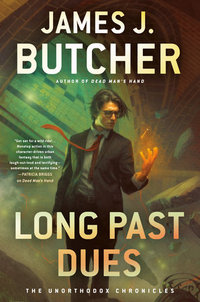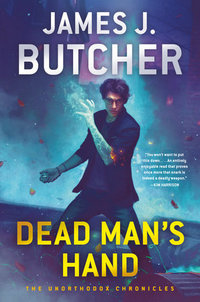 Long Past Dues
Long Past Dues
DETAILS: Series: The Unorthodox Chronicles, #2 Publisher: Ace Books Publication Date: October 10, 2023 Format: eARC Length: 401 pg. Read Date: November 13-15, 2023

“You make them sound like monsters.” [Grimsby said]
He scoffed. “If only. Monsters are much simpler to deal with than people.” His face grew grim. “Much simpler.”
What’s Long Past Dues About?
Tired of the grunt-work and make-work befitting a rookie and relatively-untested Auditor (despite the heroics that got him his job), Grimsby acts on impulse and hijacks a case assignment from the closest thing he has to a friend in the Department of Unorthodox Affairs. It’s an investigation into the remains of an unidentified ritual. His job is to figure out what the ritual was supposed to do and who was behind it—particularly if the ritual was intended to produce something hazardous to humans. Rayne can’t—or won’t—tell anyone why she was so curious about this particular ritual, but the fact that Grimsby stole the assignment from her is enough to put their already tenuous relationship at risk.
Jumping into something out of his depth and under orders to make sure he’s not working alone, Grimsby tries to shake Mayflower off of his new/renewed attempts at putting the bottle to his head and pulling the trigger. Mayflower eventually emerges to help—not because of anything Grimsby said, or out of a sense of duty. But Grimsby dropped a photo that reminded Mayflower of one of his biggest successes, one of the rare times he shot someone and wasn’t haunted by it. How is anything about it back to rear its head?
Grimbsy and Rayne fluctuate between working together, racing each other, and trying to save each other while on this case.
While Grimsby was waiting for the Huntsman to come around, he spent a little time trying to help Wudge with something. It didn’t go wholly according to plan. Or much according to plan at all, really. Along the way, Grimsby picked up something that twists his magic in a way he’s having trouble adjusting to. And picked up an enemy—or at least adversary—or three. All of which is going to complicate things for him in the immediate future.
Digging Deeper into Mayflower
The first book explored both partners, but we learned more about Grimsby for sure. The accent fell more to Mayflower in this book—at least when it came to backstory and filling out the character—Grimsby was the focus of the plot again, to be sure.
That said, I think most readers would’ve guessed correctly to 95+% of what we learned about Mayflower here. But it’s good to have it spelled out for us—not in a spoon-feeding way, but the kind of confirmation that’s welcome. We also get a better understanding of what Mayflower sees in Grimsby, why he stuck up for him, and did what he had to to get Grimsby recruited by the Department.
Again, we probably could’ve guessed it, too. But I liked actually getting to see it.
I enjoy the way the two partners see themselves and each other—the way those perspectives conflict with each other and the way they roughly match up.
Wudge
It’d be super-easy to consider Wudge as comic relief primarily—with a hint of pathetic. Sure, he’s good for another perspective on the supernatural world and to help Grimsby out in a pinch—but he’s first and foremost someone to laugh at. Like Dobby. (I’m saying that because I’ve slipped into it, and that makes me feel better)
But it’s a mistake to think that—he’s more like Gurgi early on—funny, pitiful, with a hint of malice. Like Hearne’s hobgoblin Buck, but less trustworthy (and less easily amused). He’s dangerous, he’s looking out for himself more than anything—and is perfectly willing to take advantage of Grimsby. You, like Grimsby, can’t help but like him when he’s around. You feel bad for the guy and hope that Grimsby can give him the assistance he needs.
But something tells me that he’s more like the scorpion that stings the frog as they’re crossing the water together—his nature isn’t to pal around with a human. And we’re going to regret chuckling at him in the near future.
Or, I’m way off base and I’m going to have to come along and issue a retraction.
The Anti-Nick Fury?
Without getting into particulars, this book ends in a very similar way to the way its predecessor did. Someone out there is scheming, picking up the pieces from whatever Grimsby, Mayflower, and the rest of the Department left behind (and one has to assume they’re doing this with non-Grimsby cases, too). Exactly what they’re doing with the people and artifacts left behind we’re not told. It’s clearly ominous, but that’s about it.
It’s like the opposite of the post/mid-credit scenes in the early MCU movies where Fury is recruiting people for the Avengers Initiative. It’s more like those scenes in the Garfield Spider-Man movies (although, it’s been a few years so my memory is pretty fuzzy)—everyone, including Spidey, has thought he saved the day, righted the wrongs, and sent the bad guys packing, someone is out there coming along behind him with something clearly nefarious in mind.
Now, if James J. Butcher has really learned much from Jim Butcher, I expect that we’ll see/start to see what this has all been leading up to in Book 5. But I figure he knows that readers might expect that—so maybe it’ll be Book 4 or 6 instead. Whenever he reveals what’s cooking in these last looks, it’s going to be big. And it’s going to be bad news for Grimsby and Mayflower. It’ll be good for the reader, no mistake, but bad for our heroes.
Grimsby climbed out of the jeep and glanced around at the lot of black, mirrorless cars. Mayflower’s rusted-out vehicle stuck out like a mountain crag in the middle of a rolling black sea.
“Didn’t they offer you a car when you came back?” he asked as they entered the building’s concrete facade.
“They tried,” Mayflower said, then scoffed. “Even insisted.”
“And you said no?”
“That jeep has been with me since the start. I’ve rebuilt her from little more than scrap more than once. I know every sound she makes, every grind of every gear. You think I’d trade that for anything?”
“Okay, but have you ever thought about the ship of Theseus?”
“Yes.” The Huntsman scowled. “But Theseus never had a jeep.”
So, what did I think about Long Past Dues?
So, yeah, I picked up on the big twist pretty early on. And then the twist to that twist, too—although I’m not sure I got that earlier than Butcher wanted us to. Being ahead (?) of where we were supposed to be didn’t diminish things at all for me—if anything it amped up the suspense for me because I wondered how long it was going to take for Grimsby and Mayflower to suss it out, and how bad things were going to have to get for them to see it.
I’m rarely that into a twist surprising me—I’m far more interested in how the reveal is executed and Butcher did it just right here—I wouldn’t have minded the heroes putting the pieces together a bit quicker, but I’m not going to complain about how it came about. What I didn’t expect was just how it was going to play out after the reveal—and what the long-term ramifications were going to look at. And…whoa.
So much of what I thought was going to happen to/hoped would happen for Grimsby over the next few books went away in a paragraph or two. I feel so bad for him—and am so filled with anticipation to see what Butcher replaces my expectations with.
I really appreciate the way the partnership between the Huntsman and the rookie Auditor is developing. Whatever their bond in Dead Man’s Hand may have been, they’re not BFF’s by any means at this point. There are growing pains ahead, stops and starts to their partnership, and some pretty big obstacles they need to work through. But at the core—that relationship, respect for, need (?) for each other is a great starting point to see both grow as people and agents. I don’t know that Mayflower will ever get all his issues resolved, all his personal demons exorcised, etc. But he can get closer, he can maybe become really functional again—and that’s enough.
We got a couple of new and potentially recurring characters here that I really enjoyed. The magic—and the magical worlds—are enough to satisfy an Urban Fantasy fan. The monsters—and how they manifest in the real world—are great. The societies—Usual and Unorthodox—are intriguing in all the right ways. The banter is just what a buddy-cop reader wants to read. The moral choices aren’t easy or too clear-cut (which is great). The principal characters are engaging and believable. Basically, this series is really working for me. I can’t list all the things it’s doing right, actually.
I don’t have any major criticisms or complaints—I just want more of this series. Next year and for at least a handful of years to come. Long Past Dues didn’t disappoint and lived up to the promise of Dead Man’s Hand. Can’t ask for much more.
Disclaimer: I received this eARC from Berkley Publishing Group via NetGalley in exchange for this post—thanks to both for this.

This post contains an affiliate link. If you purchase from it, I will get a small commission at no additional cost to you. As always, the opinions expressed are my own.
![]()




 Grab a book, any book.
Grab a book, any book.
